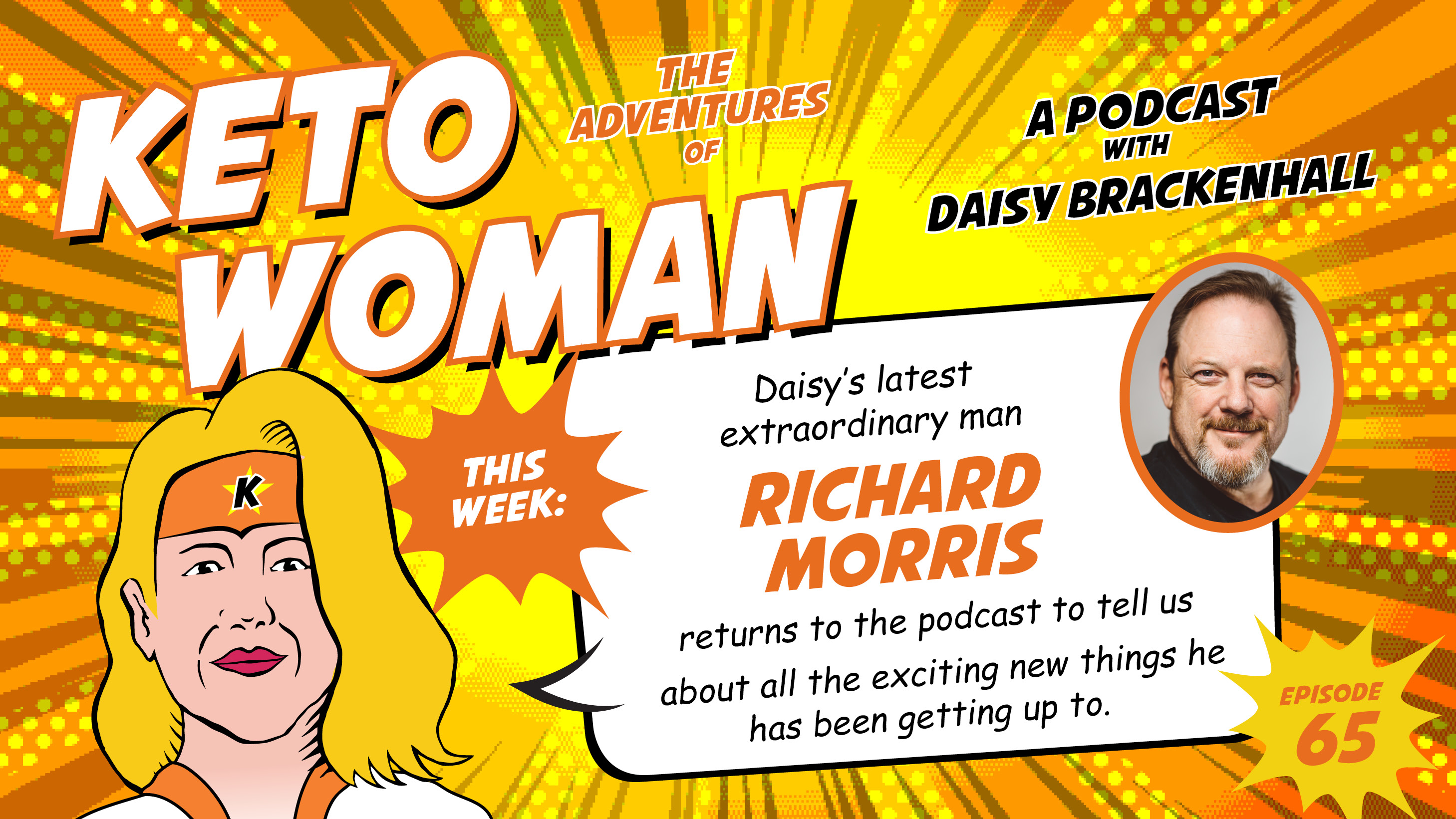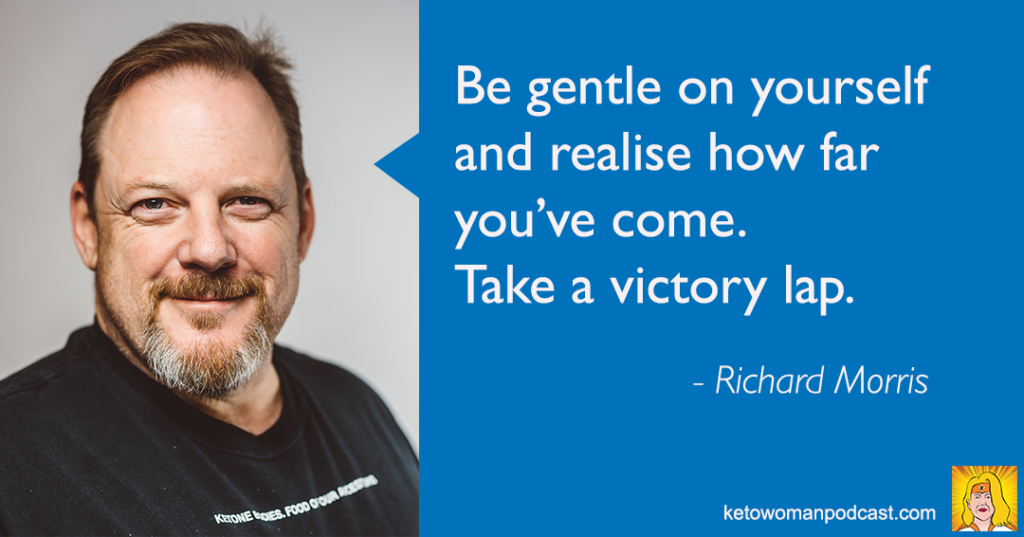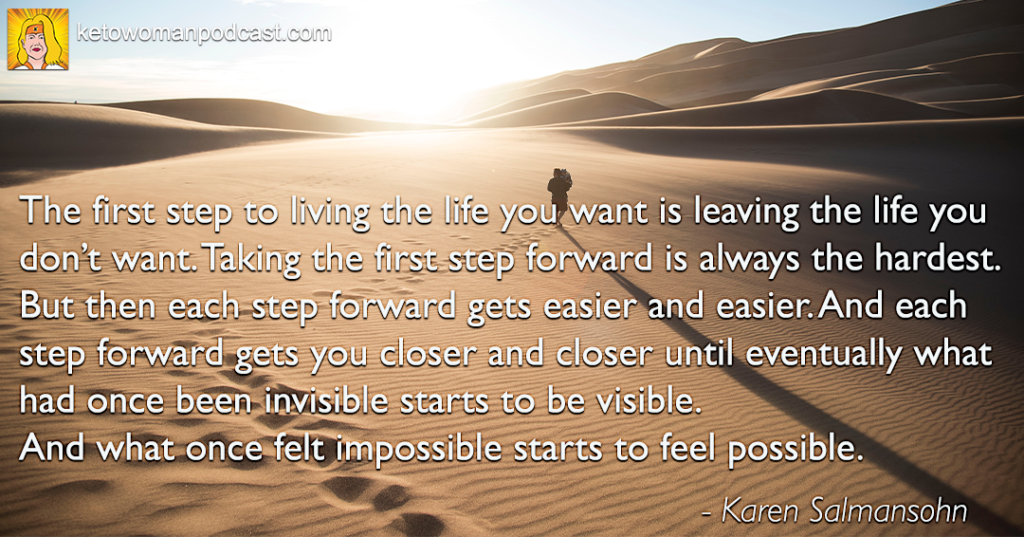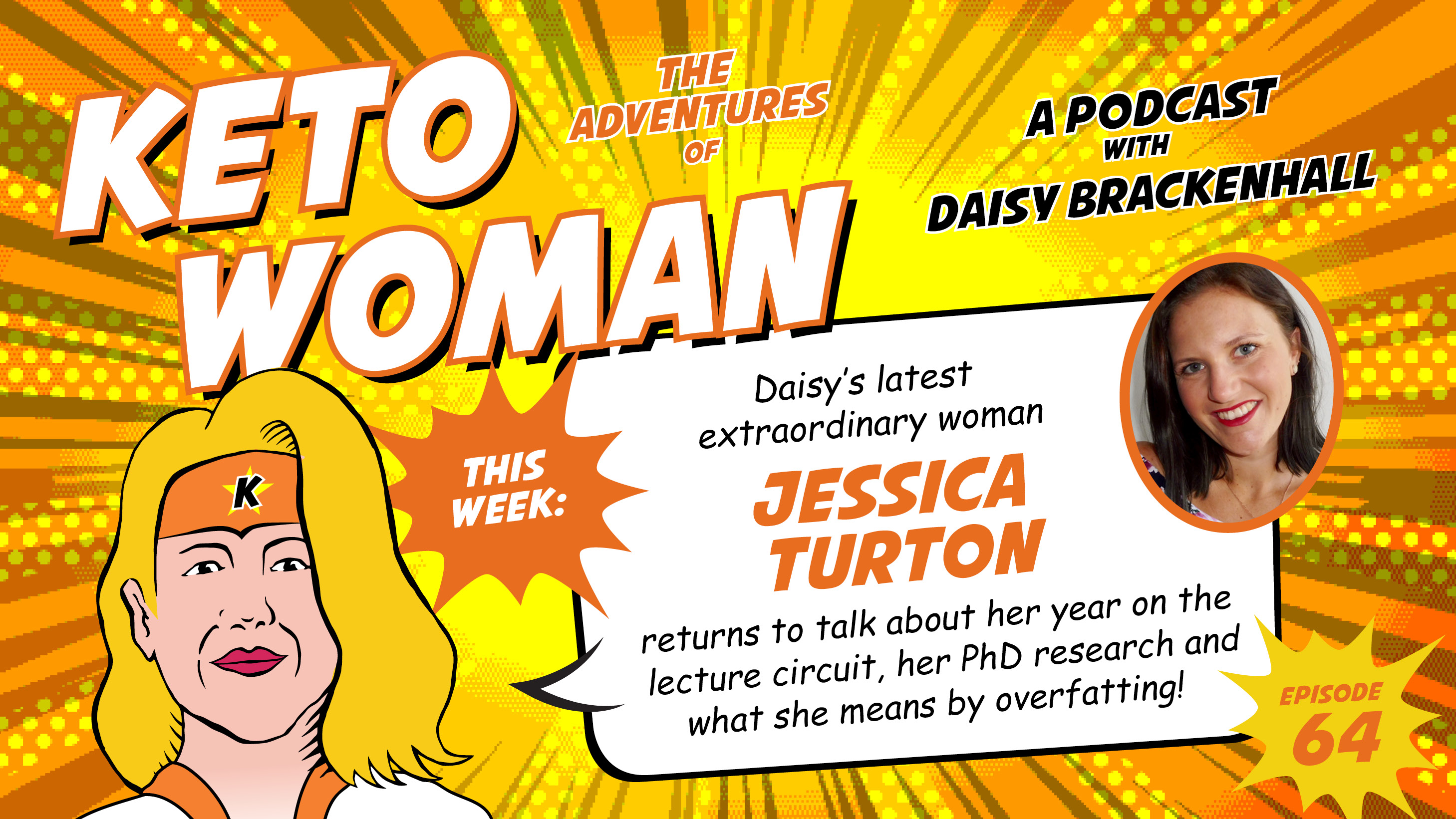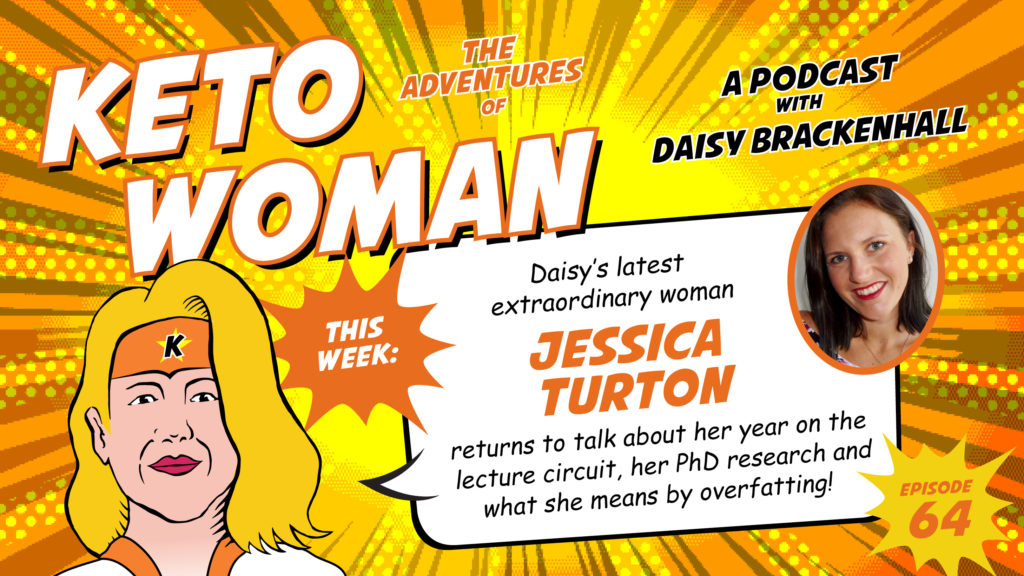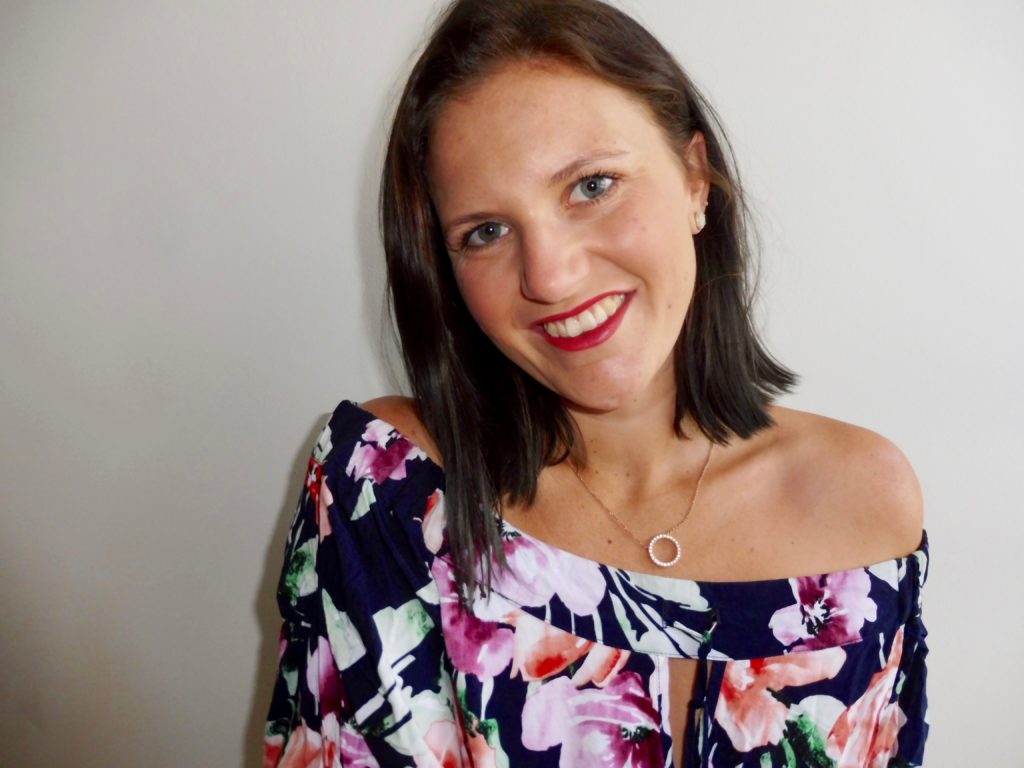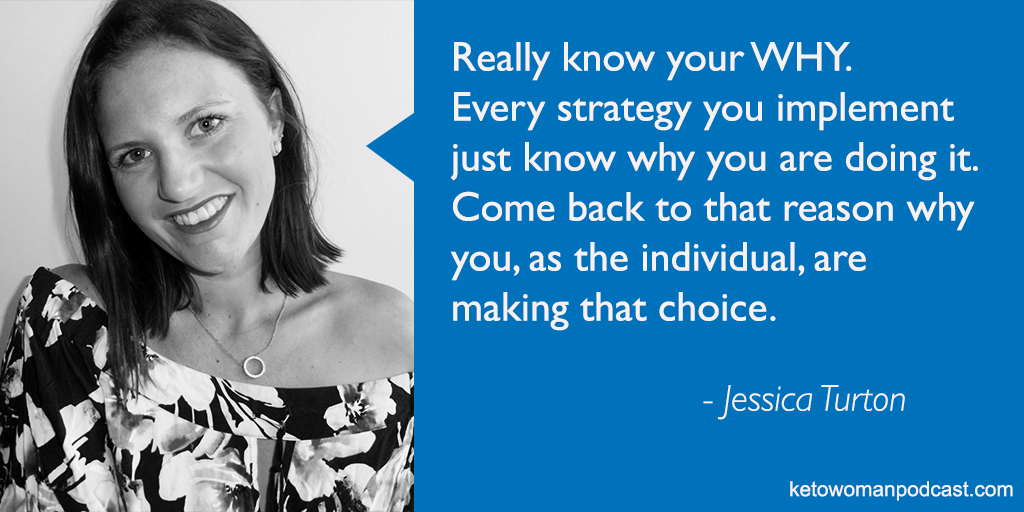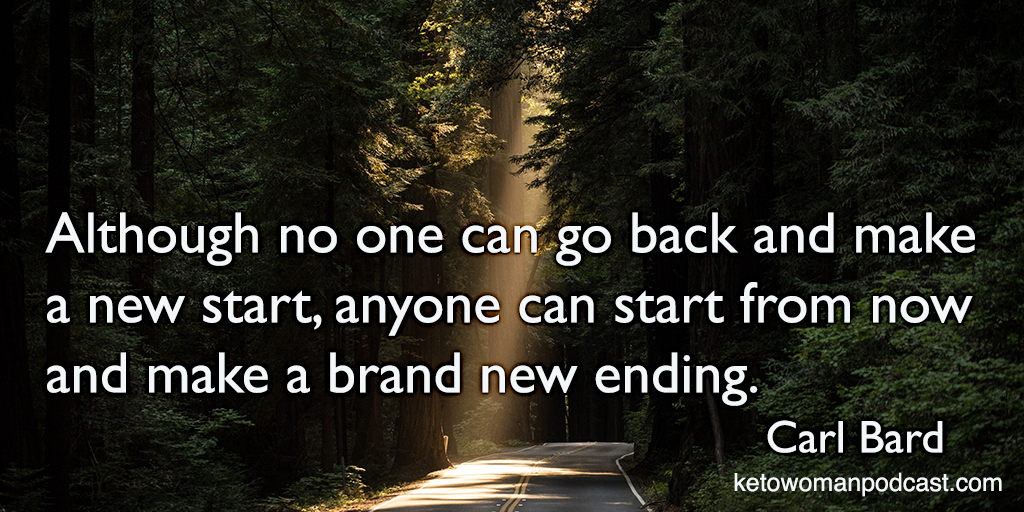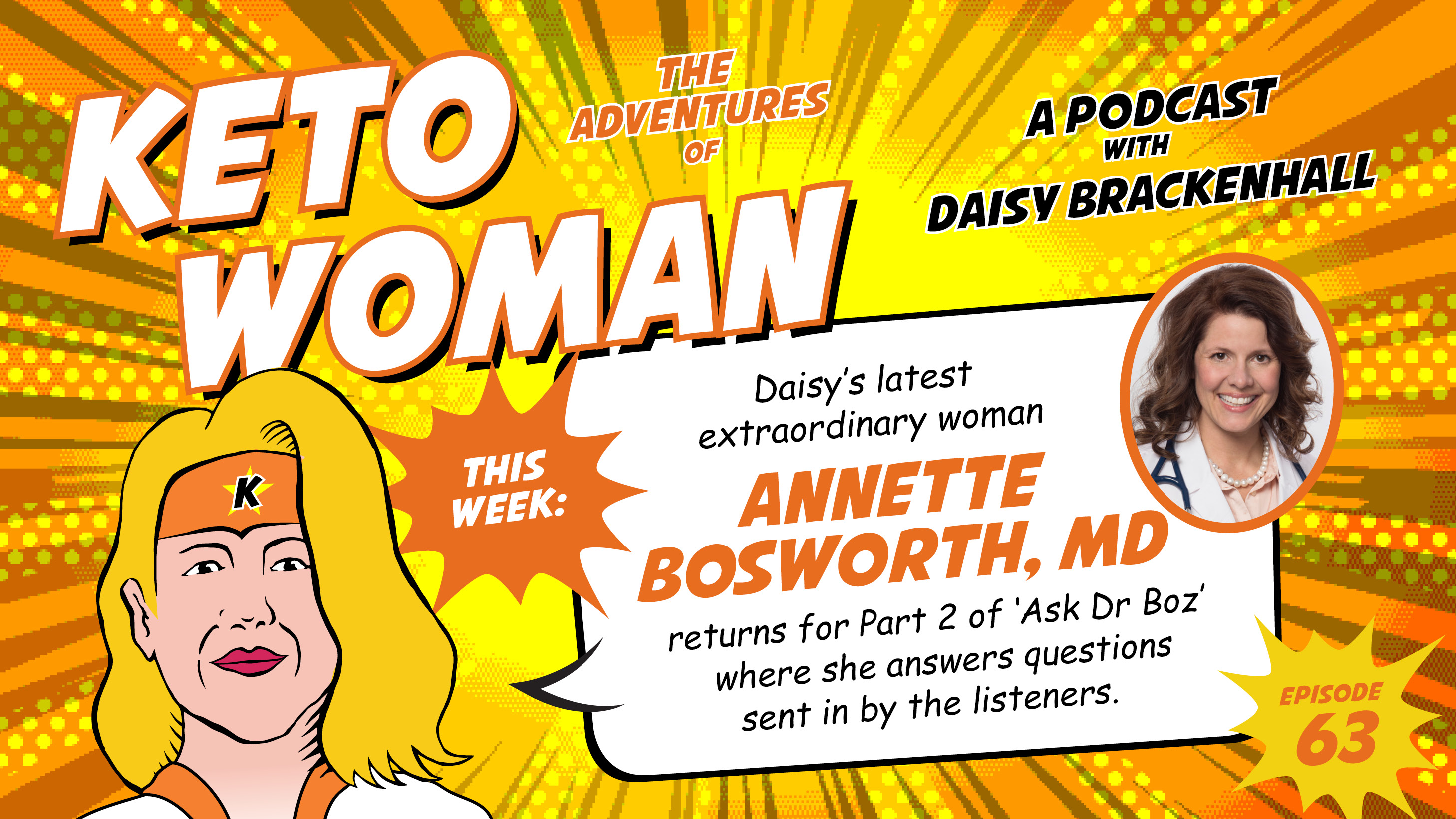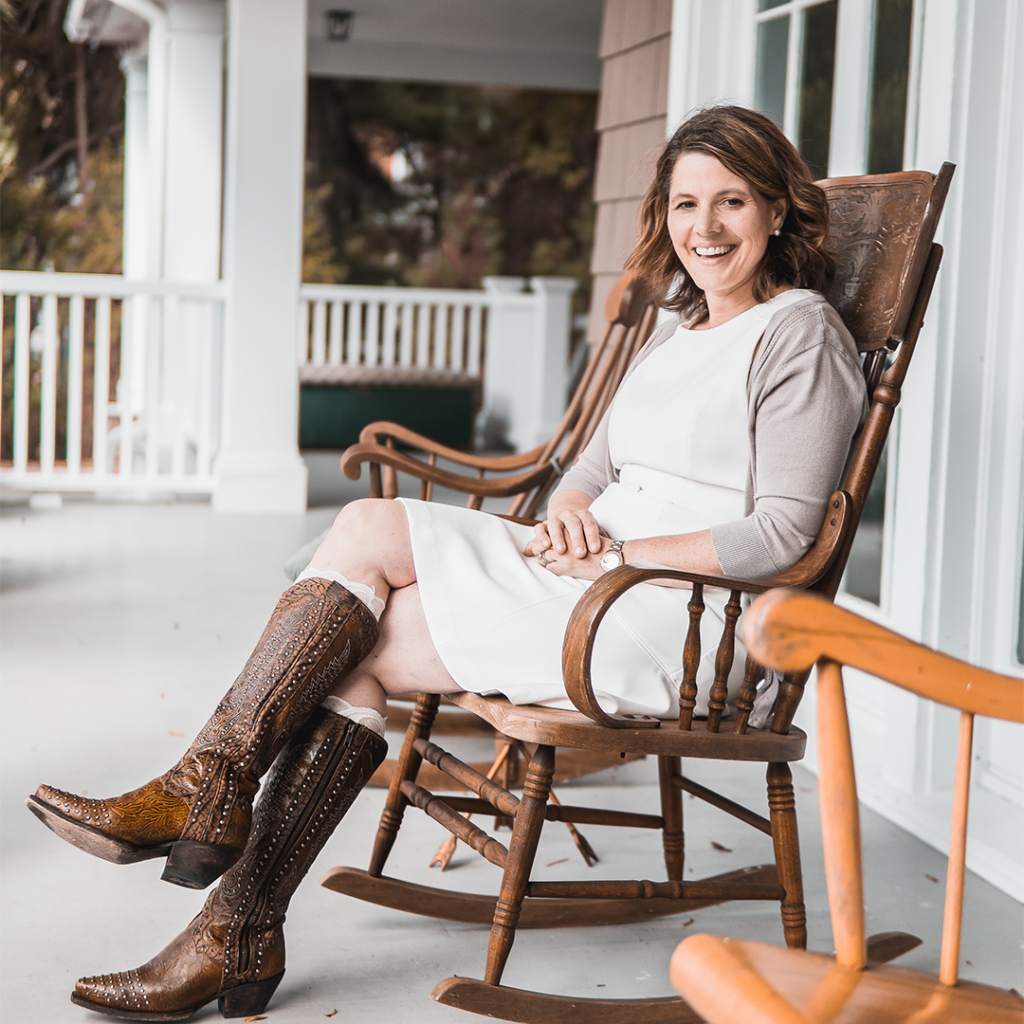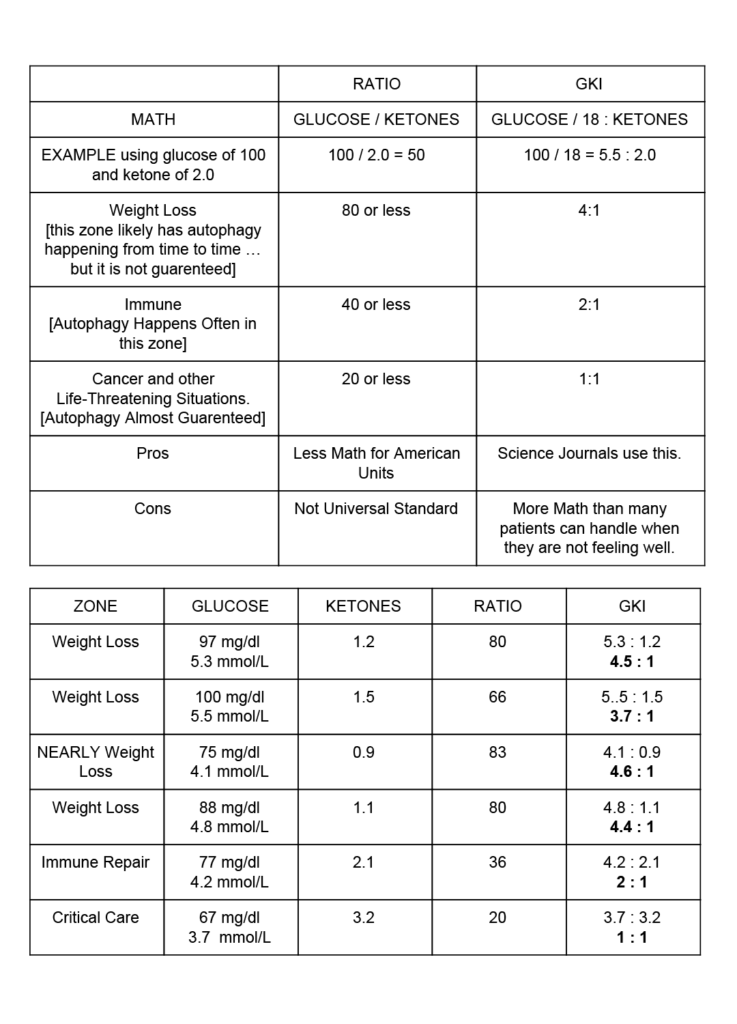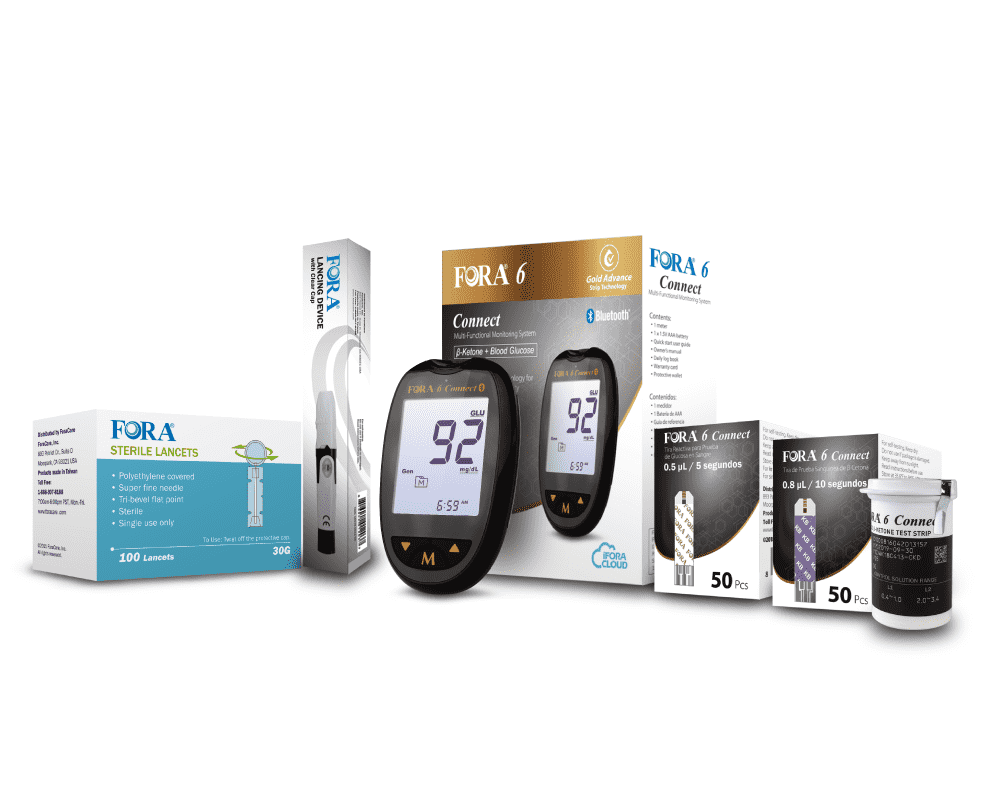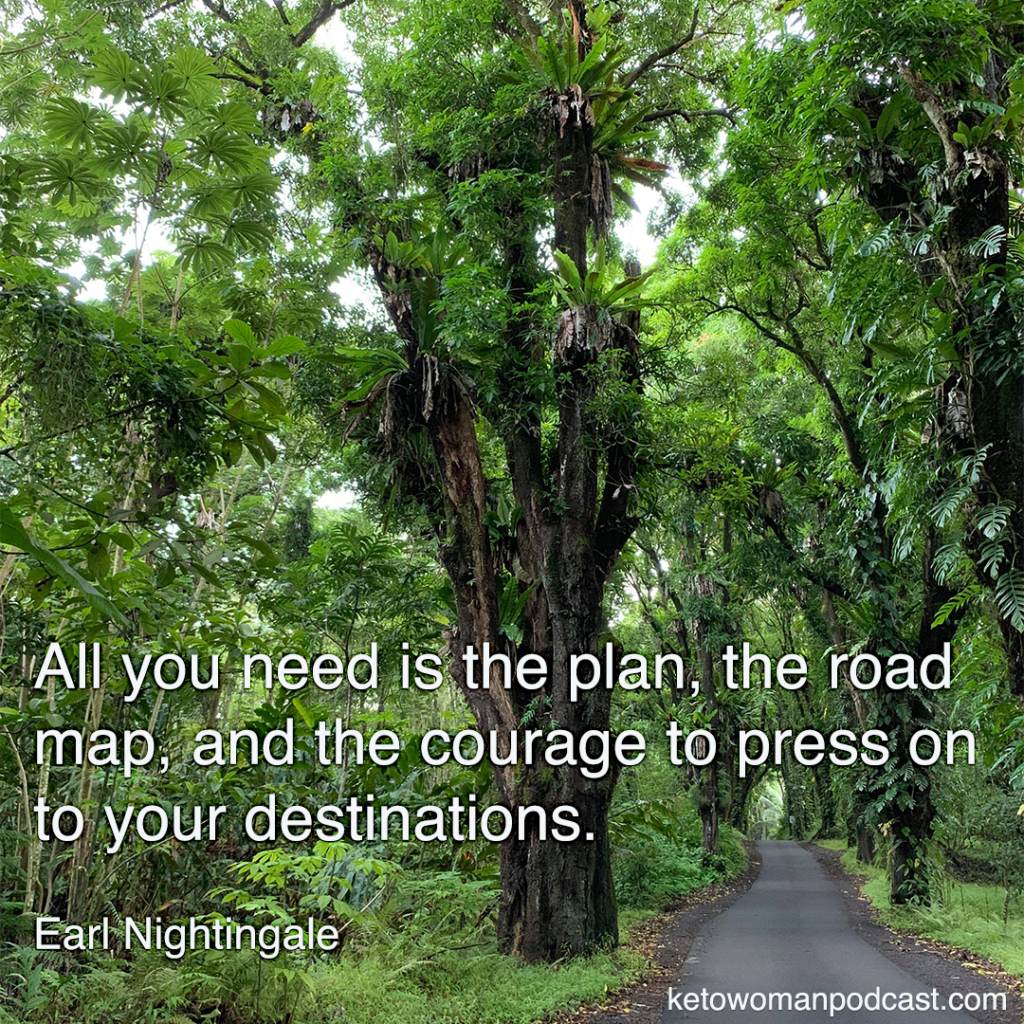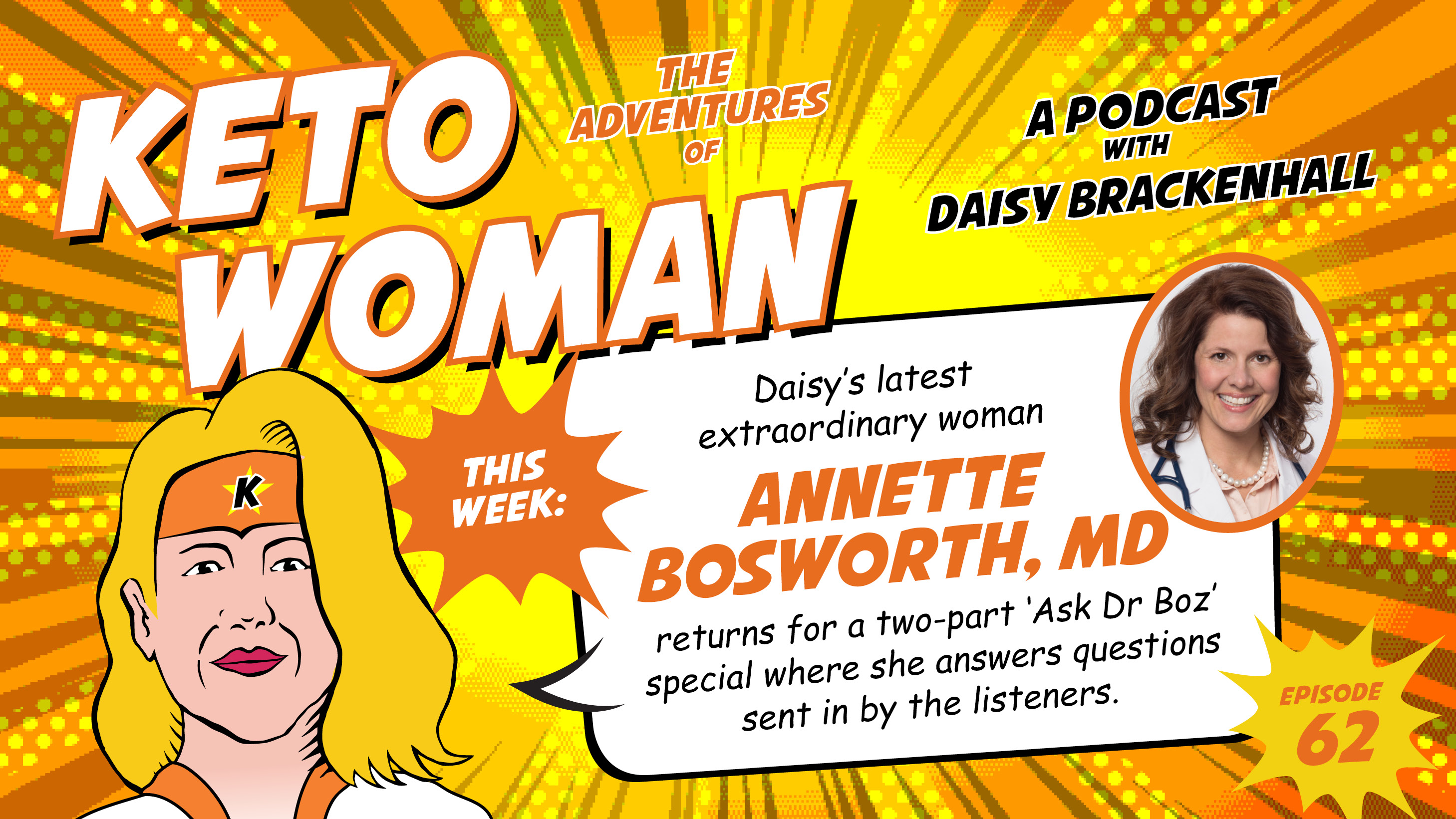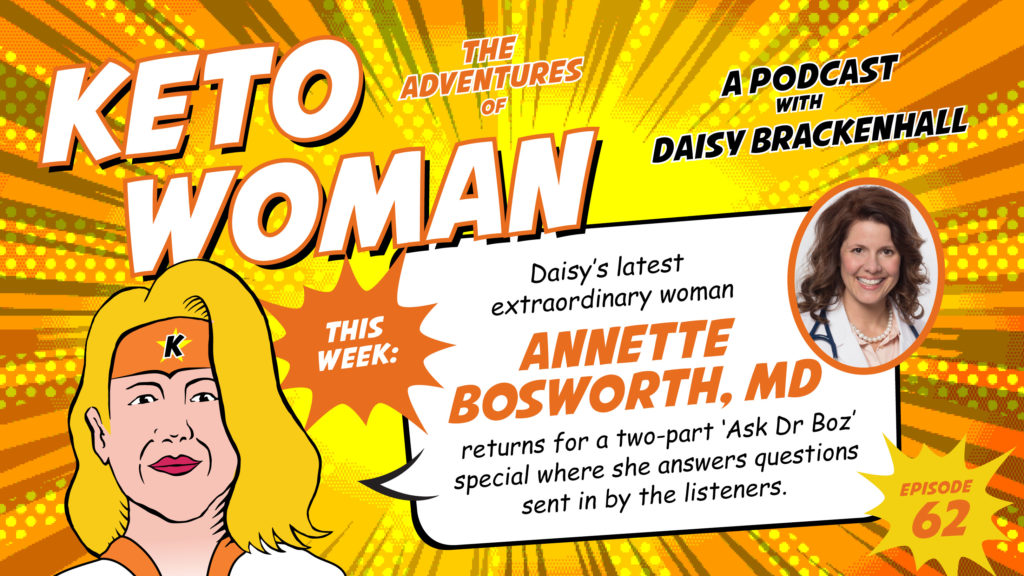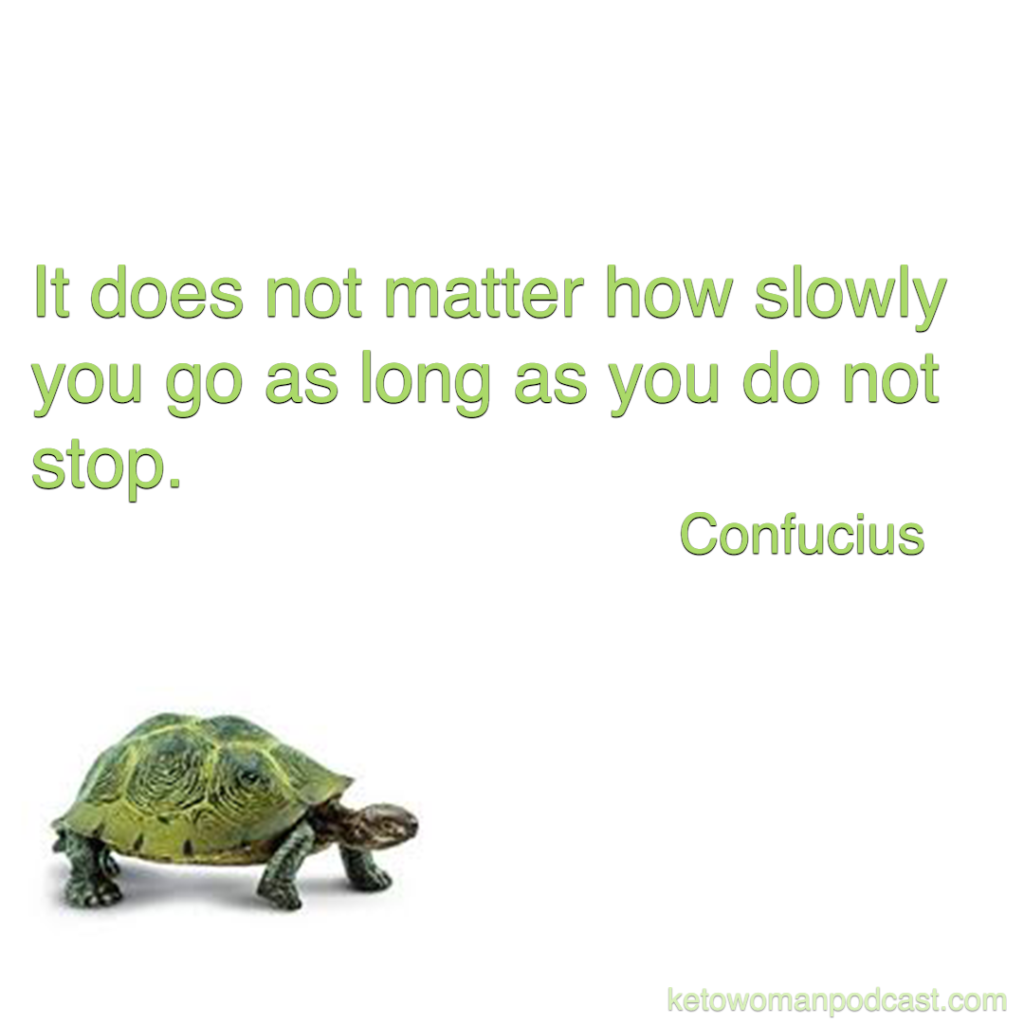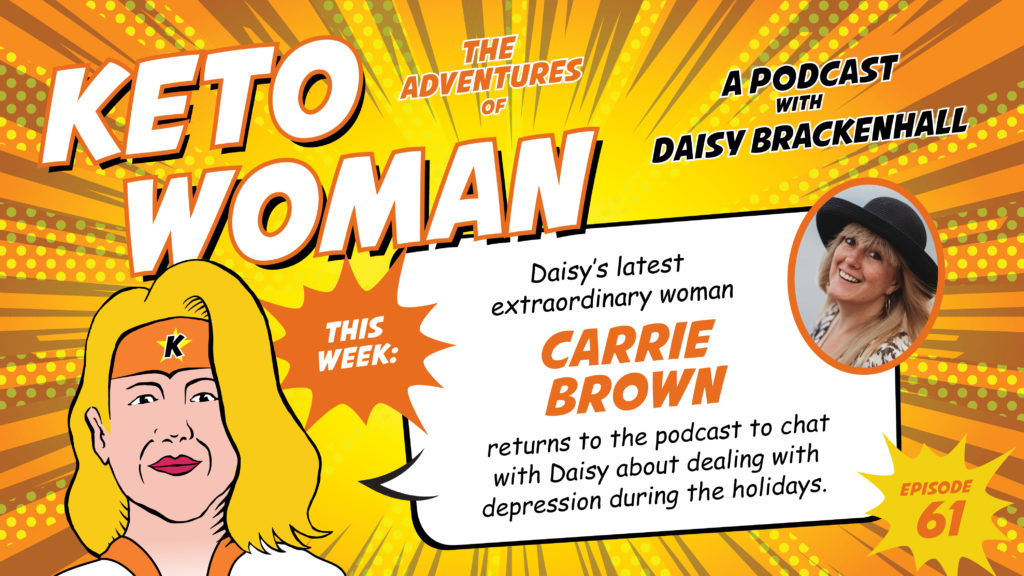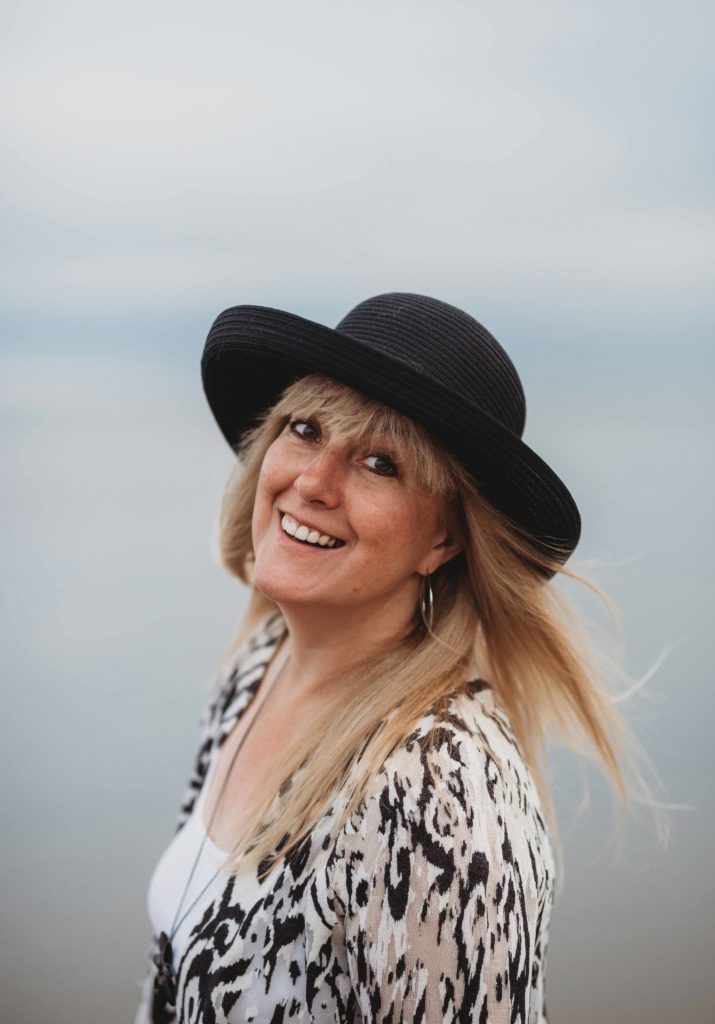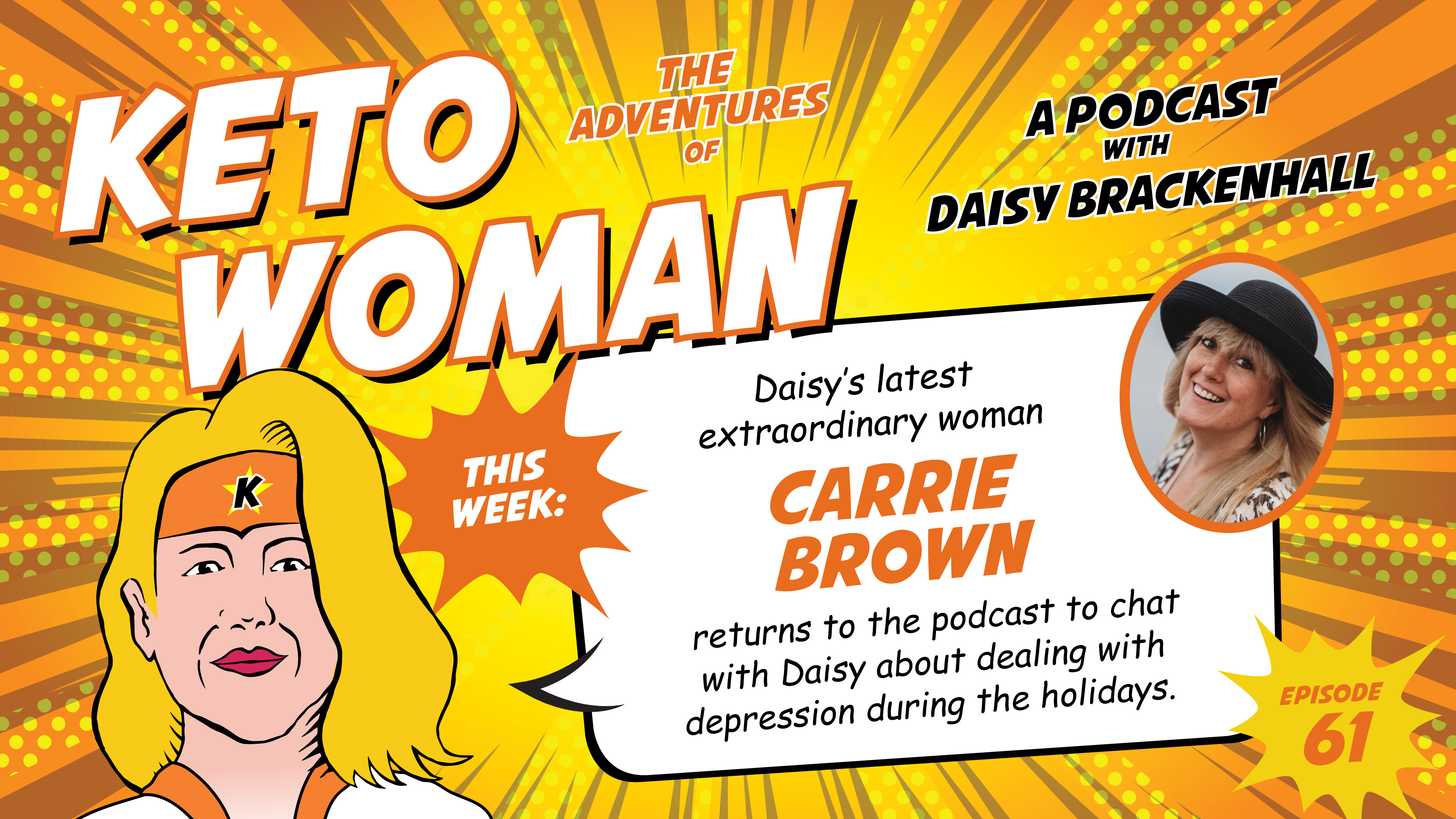This transcript is brought to you thanks to the hard work of Trish Roberts.
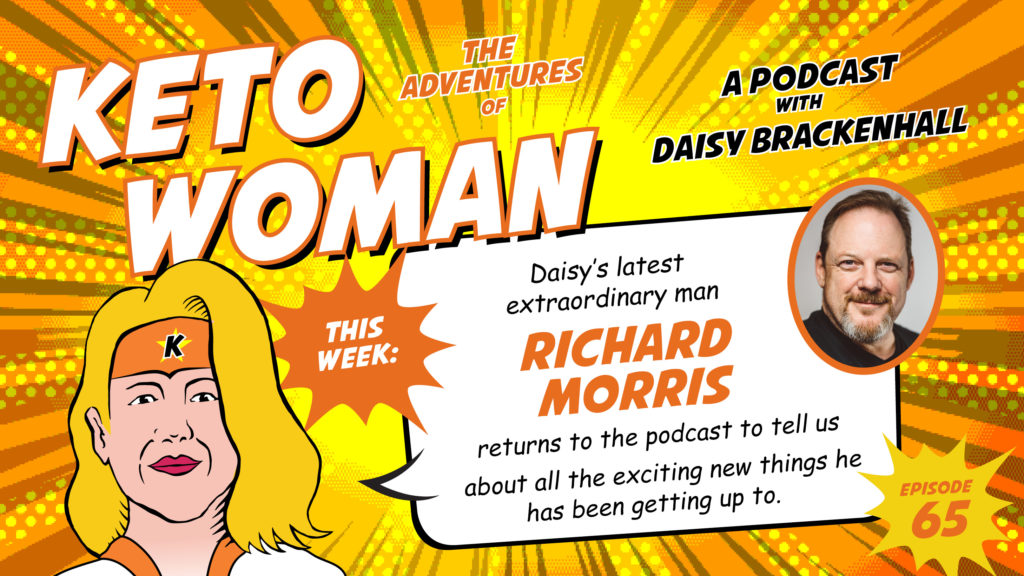
Welcome Richard to the Keto Woman podcast. How are you doing today?
Thank you Daisy. I’m actually doing really well. It’s hot here. It’s the middle of summer in Australia. I got a really bad sunburn the other day and it’s about 11:00 PM at night and I’m drinking scotch. So I’m fine.
Well, it’s not so long ago we were literally sitting across the table from each other.
That’s true.
I still haven’t quite gotten over that surprise.
I’ve actually visited chez Daisy. Very few people have. I think myself and Louise Reynolds are the only guests who’ve been.
That’s true. Out in the middle of nowhere in the woods. You said the Uber driver was a bit worried about dropping you off, wasn’t he?
He was scandalized. Because we started out from Toulouse which is about two hours’ drive away, so it was a two hour Uber trip. And the roads… at one point we came up to a barricade, which was just a, a toll booth for the freeway and it was covered with people with protesters with the yellow vests and they were all like…
Oh, the gilets jaunes.
Yeah, the Uber driver was really worried.. They waves us through and said that the government is paying your toll for the day. So they were literally manning the barricades. The French really do know how to protest. But anyway, we started on a major freeway and then it got down to a smaller road, and then sort of like a country road. And then there was like, at one point… Roads? We don’t need roads where we’re going. It was just like into sort of like a green undergrowth, and just into a general area, general direction, and the Uber driver’s like, I’m not going to leave you here. You can’t speak enough French to be able to… for me in all honesty, to just leave you in the middle of nowhere. And then I saw your name on the letterbox and I said, ah, I know where I am. So yeah, I finally made it. But yeah, Daisy literally lives in the middle of nowhere.
Yeah, it is properly down a track in the middle of the woods, isn’t it?
Yeah, totally. And a track full of salamanders, orange and black salamanders.
That’s right.
We don’t have salamanders in Australia, so that was really kind of weird.
Yeah, they’re really cool. They seem to come out… I must look it up, but it’s a specific temperature range it seems. They tend to start seeing them about November, and they like it when it’s wet and they’re obviously nocturnal because you see them at dark. But I haven’t seen them recently. I think maybe it’s got too cold. I go out and… and they’re… they don’t all have names, but there’s one that usually hangs around the front doorstep called Sydney.
Okay. Well I hope I didn’t step on any by accident. My apologies if that happened.
But they’re pretty cool, aren’t they? But yes, you do see them, you see them on the roads a lot. I think they hang around under the leaves that gather at the edges of the roads. But they’re pretty cool. They’re very striking, aren’t they?
Yeah, absolutely. Remarkable. So yes, I’ve been to Chez Daisy; I’ve met the dogs; and I’ve slept on Daisy’s hearth…literally.
Yeah, I put you in front of the fire. The warmest spot in the house.
Luxury.
I didn’t know whether the dogs would dessert me and all pile on you seeing as you’re in front of the fire, but they stuck to their routine. I think they came and jumped on you in the morning, didn’t they?
Yeah, they absolutely did. Did you tell your listeners what we did? Louise basically stitched you up. She was telling you, oh, I’m coming to visit you Daisy. And you were running around sort of cleaning up the place.
Yeah. Thank goodness! Thank goodness! Yeah, she told me she was coming because the house was an absolute tip. So yeah, it gave me the push I needed to give the house a clean. But yeah, it was the updates all the way through. So she was like, yeah, I’m stuck at Amsterdam. I missed something…
That was me.
I’m like what on earth are you doing at Amsterdam.
I missed my flight.
And yeah, she came up with this whole ruse about how she’d got flights in a Black Friday sale, so hence why she’d sort of gone via… because why on earth would you go via Amsterdam to go from London to France? So yes, there was a great story for all of it, so she managed to keep it all going. Yeah. Yeah. I’m in the car on the way up and yeah, so am I going to meet you at the junction of the motorway? No, no, I’m coming all the way to… How did you manage that? Oh, I sweet-talked the driver and that’s it. None of which I put past her, so it was all very believable.
So a lot of changes have happened for both of you and me in the past couple of weeks.
They have. They really have. It’s been a whirlwind. I haven’t been glued to my computer and the Internet so much for a while, but I’ve literally been plugged in trying to learn how to do all the things. How to edit, how to produce the podcast, where to put it, who to put it with, who to, how to… Oh, yeah my brain is starting to leak out of my ears. But it’s all very good fun as well. I must admit I’m enjoying it, but it’s that case when there’s so much to do, and not enough time to do it, and you go into a bit of a head spin, but it’s stimulating and fun at the same time.
Definitely an opportunity, yeah.
A bit like Ketofest. That was a whirlwind of hard work and getting really tired and stressed out, but such fun and really enjoyable at the same time. It’s that balance between the two, isn’t it?
Yeah, I liked it. For me it’s really meeting old friends for the first time.
Yeah, I love that phrase. It’s perfect. It really sums it up, doesn’t it?
It does, absolutely.
And what about you? A few things are changing for you. I’ll tell you what though, we’ll get to that. We’ll get to that. Let’s go back. I want to hear about the Richard behind the 2 Keto Dudes. A bit more about you and where you come from and what led you to the place. We’ve heard the story about you getting to the point where you were potentially going to lose a toe and that led you down a path of investigating how you were going to fix yourself. But what led to that? What was the build-up?
I was working in America. I was a software developer and during the Y2K era, software developers were highly sought after. An American company approached me in 1998 and asked me to come over to work for them in Florida, and so I worked for them in Florida. Then I was poached by another company on Wall Street. I worked on Wall Street for two years, from 2000 to 2002. A third company in Las Vegas poached me to run their business, be their Public Executive. It was a software company with a hundred developers. I sort of transitioned out of being a line developer to a senior manager, to be an executive. At the same time, I started to notice that I wasn’t feeling very healthy. When I was living in New York I was walking up and down five flights of stairs every day and I was feeling okay, but when I got to Vegas – because Vegas is in the middle of a desert, 50 degrees Celsius outside, and you just go from one air-conditioned room to the other – I started to become really unfit. I went to a doctor and the doctor said, you really should try to lose some weight and I’d just given up smoking – I was at a two-pack-a-day cigarette smoker for many years. So I’d just given up smoking, you put on a little bit of weight when you do that. And the doctor said, you really should try to lose a bit of weight. Why don’t you do meal replacements? And I said, what are those? And he said, well, instead of eating a meal, you eat this stuff in a can and it’s called Slimfast. There’s a lot of different products.
Groan….
Exactly. And this stuff is just pure sugar. It’s just nothing but…. it gets all of its energy from starch and from sugars. I went back to the doctor. I was having trouble seeing. I had to increase the size of the font on my monitors to almost half an inch in size. And I went back to the doctor and I said, what’s wrong? I’m going blind. So he said, well, we should get you a blood test. He did a blood test and it turned out that I was prediabetic. My glucose was 350, fasting glucose. My triglycerides were 1,111 milligrams per deciliter. These are US scales. I had 10 grams of triglycerides in every liter of blood in my body. I guess we have five liters of blood so, I had 50 grams of fat running around in my veins. As well as high glucose and what was actually happening…the reason why I couldn’t see was because the concentration of glucose in my blood supply was higher…or at least, actually the concentration of water in my blood supply was lower than the water in my eyes and it was sucking water out of my eyes. So I was trying to see through raisins! That happened to me while I was in Vegas and I’d had a good career and I’d been successful, but I was basically prediabetic and I went on an Atkins diet and that basically reversed the prediabetes back to a non-diabetic state.
I decided I wanted to understand why my body was falling apart, so I retired at 40 and moved back to Australia. I moved to a place called Batemans Bay, traveled around Australia for a year in a Winnebago to find this place, Batemans Bay. I didn’t have to be anywhere immediately, so Jules and I went around with Black Dog in a Winnebago for a year, basically interviewing every potential town to see whether it’s going to be a new hometown. We ended up settling in this place called Batemans Bay, and what I wanted to do was to research to work out what the heck was going wrong with my body. I went to a gym. I went to a personal trainer four times a week. I was a cycling a hundred kilometers a week to try and get fit, and everything seemed to be going well.
I was feeling a little bit healthier, a little bit better. But then a doctor noticed that my LDL cholesterol – my LDL number, the cholesterol carried in my LDL particles – was above 200 milligrams per deciliter, which is really a point above which doctors like to put you on statins. So the put me on a statin, and that made me diabetic.
Nice. Great. That’s really helpful, isn’t it? Nice little side effect. Thanks.
Yeah. Which at the time we were only just starting to get studies showing that this was going to happen in 10% of all men and 15% of all women who took this statin called Atorvastatin, or its commercial name is Lipitor. So anyone who took Lipitor and became subsequently diabetic, there’s a good chance that that contributed to tipping you over the metabolic cliff.
So it was specifically that type of statin that had that side effect, was it? Why did it do it? What’s the mechanism that that made that happen?
Yeah. They don’t really know what the mechanism is that causes that. What a statin does is it poisons the metabolic pathway that makes six or seven really useful metabolites – one of which is cholesterol – but it also makes CoQ10 which is used as part of your electron transport chain. It’s important to the heart muscles. There’s all these things that it’s messing with in terms of how you generate energy. The specific way that it causes people to lose their glycemic control, people don’t really know, but the statin manufacturers aren’t incented to find out that mechanism. What they do literally is, when they do a test to people with statins, they exclude anybody who has an oral glucose tolerance test value at the beginning of the test. So, if you’re on the edge, they don’t want to have you in the study of being diabetic.
That’s called cheating.
It’s called stacking the deck in your favor. Yeah.
What I was getting at and asking about your time before and what led up to the prediabetic and then diabetic state, would you say that way before that, I mean growing up, I mean now that you know all that you know – diabetes isn’t something that sneaks up overnight. Was this something that was brewing for a long time? Looking back, were you healthier and fit as a child? You love cycling and all the exercise, was that something you think that maybe staved off for a while and that’s what tipped it over the edge with that move from New York to Vegas?
Yeah, I think that one of the things that happens is the older you get, the more insulin resistant you become generally. And I think it was a factor of age as much as anything else. Plus by gaining weight by reducing smoking, would have contributed as well. So, there was that. Plus I had had an abnormal liver function test when I was 21. I was 35 by the time I was working in New York, so that’s like 14 years later. I had an abnormal liver function test at 21 and basically went off alcohol for like, almost five years, and then only came back to drinking rarely after that. There was something in my makeup. Genetically I was prone to becoming Type 2 diabetic. My grandfather had Type 2 diabetes. One of my paternal uncles has Type 2 diabetes. My father has the beginnings of Alzheimer’s as well. So it’s a predisposition in my genetic heritage to become diabetic. Then over time I did silly things like drinking Slimfast two meals a day. I replaced two meals a day with sugar. Absolutely horrible.
I’ve done the Slimfast. In fact, it wasn’t Slimfast, but the first diet I did – aged, I think, around about 14, 15 – was Herbalife, which is basically like Slimfast, except they throw in a few supplements as well to make it healthy. But dreadful thing. And I’ve done Slimfast, or the like, a few times over my life and it’s a shocking thing. And what is absolutely dreadful is that it is still recommended as something to do. It’s often something that’s recommended by doctors as the pre-surgery diet when you’re going into weight loss surgery for example, they’ll put you on Slimfast-type shakes to get your weight down and shrink your liver. Yes it will do that because it’s just a calorie restriction, but you could go on a keto diet and do the same thing and not turn yourself into a stabby monster because you’re having to consume these awful shakes. But they are, aren’t they? They drive you up the walls.
Yeah. I’ve never really had a problem myself with weight, so that I didn’t feel like I needed to diet because I’ve got a build that can carry a lot of weight. I was a rugby player for many years. I spent nine years as a rugby player and I’m fairly solid. I think I went on Weight Watchers at one point, in the late nineties with Jules. We were both trying to lose some weight – she convinced me that I needed to lose some weight – but other than that Slimfast was the next time that I actively really tried to lose weight, and that was under the doctor’s recommendations, so you’re right, that that is what they recommend.
It’s crazy and it does come down to perception. And I think that’s something that comes with getting older as well. When I look back at pictures of the actual size I was when I was convinced I was fat and I needed to diet…
You weren’t, were you?
I would like to slap myself multiple times about the face and say, don’t be so ridiculous. When I got to twice the size I am now that was when I was overweight, not when I was… that’s when I did to start losing some weight. Not back then. I mean it’s just crazy isn’t it? I’ve heard you talking about it and you’ve just said that you have the kind of build, the kind of frame that naturally carries a bit more weight, but it’s your perception. What do we care? Why do we have to fit some kind of image that somebody else has set up. Your healthy. All your health markers are perfect. You feel fantastic. You can cycle all day.
If I need to, yep.
You can do all the things, so why do some people still insist on judging you by your size and what size trousers you fit into?
That’s going to be their problem, not mine.
Exactly.
I look at it this way – and I might leave this actually as a top tip later on for the end of the show – if you have lost a large percentage of your body weight, if you’ve lost more than say, 10% of your body weight – and I’ve lost 33% of my body weight – and then you stall, count your blessings because you’re not putting back on that 33%, or 10% or whatever it is. You’ve reached a new homeostasis. If I could get inside people’s heads and make them feel better about themselves, about how far they’ve come…that’s probably what I tried to do in Keto Dude’s podcast to explain to people, just because you are in an overweight category doesn’t mean that you’re unhealthy. It used to mean you’re unhealthy when all of your other biomarkers were bad, but once your glucose is in control, and your insulin is in control, and your lipids are perfect, and you’re otherwise quite healthy, being overweight – if you are – actually predisposes you to live for longer than people who are underweight. Take advantage of it.
Exactly. And so you actually came to this with a slightly different perspective. A lot, and I would say possibly most people, end up approaching keto from a weight loss perspective, but you very much that, although that had been mentioned by the doctor and okay, it was something potentially to address, that wasn’t your focus, that wasn’t your perspective. It was things like, to start off with your eyesight going. It was all about health markers and then the diabetes, and you trying to figure out the mechanisms and what was going on. So pick up back where I diverted you. You were back in Australia and you were going to the gym but things weren’t working as well as you wanted them to.
You can actually see on my blog the progression from 2011 to 2014 when I went on keto. 2011 was when I started on the statins and I progressively became visibly very sick. But if you look at my blood markers, a cardiologist will say the man in 2011, who was merely overweight, was really unhealthy because he had an LDL of 200. And then if you look at as I was the day before I started keto, I had put on almost 40 kilograms of weight – 80, 90 pounds of weight – and, my LDL had dropped from 206 down to… I think it was 76 was my lowest… or certainly between 70 and 90 was my lowest, for about a year there. A cardiologist would look at the actual numbers and say, clearly the person with an LDL of 96 is much healthier than the person with an LDL of 206.
But blind Freddy can look at the two photos and say – clearly the guy who’s 40 kilos heavier, and severely diabetic – that guy’s clearly unhealthy. It became obvious to me that we don’t know what we’re talking about when it comes to metabolic health. I had tried Atkins back when I was prediabetic in America. I had an ingrown toenail that was going sideways, and I went to the doctor in the emergency room – this is what got me to go keto – and I thought I was no longer diabetic and he looked my ingrown toenail and he says, you have a problem with glucose. And I said, I used to have a problem with glucose. I should be okay now. He tested it and my fasting glucose was 20 millimoles per liter, which is 300 and something milligrams per deciliter.
And I said, yeah, wow! I really do have a problem with glucose. He said, if you can’t control your glucose, and based on your numbers I don’t think you can, you could lose that toe because we can’t find an antibiotic that is able to have an effect on your healing. He said to me, I want you to go on this new drug called Januvia. I looked into some studies of Januvia and there are cadaver studies that show that people who died of unrelated diseases like strokes and what have you, who were on Januvia, had a predominance of pancreatic duct tumors growing. And I said, I’m not sure I want to go on Januvia if it’s causing people to have pancreatic duct tumors. I said, give me three months. I have an idea. I’m going to try something out, give me three months and I’ll see if I can change my glucose and if I can then will you decide against maybe putting me on this horrible drug. And he said, sure give it a go. He didn’t expect that I would get anywhere.
Can you just explain – because this is obviously something that’s really, that stereotypical image of when your diabetes gets so bad that you end up literally losing limbs – what is the reason for that? Why does that happen? Why is it so bad to have too much glucose running around your system?
There’s a bunch of things happen there. One of the things that Professor Noakes talks about is the fact that diabetes, at its core, is a disseminated vascular disease. Essentially what he means by that is that you get more heart attacks because you get more atherosclerosis, your small capillaries that feed the periphery of your body and keep the nerves in your body fed, start to clog up. All of a sudden, not only do you not have adequate circulation to get to your fingertips and your toes, but you’re losing all the nerves in them. So you could be walking along and you could stub your toe and rip a hole in the bottom of the toe and not even know about it because you’re diabetic. I know Type 2 diabetics who cannot feel anything below their waist they’ve been in a horrible state for several decades.
That’s what happens and you can’t feel anything, so you can’t know that you’ve done any damage. And when you do do damage, bacteria feed really well on glucose. If you have high glucose in your blood that’s being pushed into all of your tissues, your bacteria is going to find that to be a wonderful food source. Plus you don’t have circulation getting to that area to bring immune defenses in. There’s a lot of reasons but peripheral neuropathy, which is where your peripheral nerves start to die off, is the primary cause of lower extremity amputation.
It’s an awful thing. And like you say, it’s progressive. I know somebody here who literally had started to have trouble driving and he actually drove me once back from the hospital and it was terrifying because he couldn’t feel the sensations in his feet properly. So obviously his feet weren’t as responsive as they should be on the pedals and the car and it was terrifying. He shouldn’t be driving.
No. It’s like somebody driving in high heels or stilts. Somebody’s driving and trying to do everything with stilts on. Diabetes is a horrible disease. It takes your eyes, it takes your kidneys, it takes your limbs, it gives you a heart attack or a stroke. And your kidneys of course. Eventually, if you’re lucky you’ll probably die of a heart attack before you really have some of the really horrible complications set in. Gangrene is not a good way to go, for example, but it’s a horrible, horrible disease. And the thing is, it’s progressive. Everyone told me as soon as I was diagnosed, everyone said, right, that’s it for you, it’s only going to get worse from here.
This is what you’ve got to look forward to.
Yeah. All you can do is slow the progression. And this is how we medicate people. We medicate them to slow the progression as much as we possibly can. I remember going to a group in Batemans Bay – this was a certified diabetes educator who is on rotation – she basically swings through all of the local towns, sort of once every month she goes to Batemans Bay – and they have a group there and they talk to you about appropriate foods, portion sizes on plates, and it’s all about reducing your portion control because…there’s this crazy post hoc logic fallacy that people become overweight and then they become diabetic, therefore being overweight causes diabetes. If we can stop them being overweight their diabetes might be as bad.
Which is entirely not how it works. But all these diets are really horrible, calorie restriction, but they’re feeding you carbohydrates and making sure that you have enough carbohydrates so that their drugs work to lower your blood glucose. I remember the certified diabetes educator, I said to her, look I remember Atkins back in 2004 really helped me reverse prediabetes. And she said, no, that’s not possible. She said, diabetes is not reversible, it’s only progressive. If you have had prediabetes there, it’s getting worse. You’re just not aware of it. And I said, well I’m pretty sure that my endocrinologist at the time said, whatever you’re doing, keep doing because it’s reversing your disease. And she said, well he probably doesn’t know what he’s talking about. For the record, this guy was a Professor of Endocrinology who discovered that insulin is pulsatile, and was like the first person outside of the inventors of the Insulin Assay to do an Insulin Assay.
I thought he didn’t know what he’s talking about. And they keep feeding you the carbohydrates, because otherwise the drugs they’re giving you have the potential to send you in a hypo. So of course you’ve got to have the carbohydrates or it could be really dangerous.
That’s right.
They spin the whole, well be careful, the whole hypo is dangerous – could kill you – so they breed this fear.
They put me on an 1800 calorie a day diet with 306 grams of glucose in it – starch and glucose. I said to the CDE – the dietitian essentially – this is crazy, the Atkins diet did help. And she said, if you tell anyone about the Atkins diet in group, I’m going to kick you out of group, and I said, don’t bother I’m out of here and I never went back. I found out later that she’s just retired with Type 2 diabetes in a caravan down at Batemans Bay. I could help her. It’s really sad. This is the reason I really got angry and I was getting a bit militant on Facebook at one point…everything they’re telling you about diabetes is wrong. They’re lying to you. It can be cured. And that’s how 2 Keto Dudes happened because Carl Franklin, who’s been podcasting since 2002, heard me saying that. He’d just been diagnosed diabetic and thought, I’m going to give that a try. If I can eat bacon and eggs, I’m up for it. The rest is history.
So you said, well give me three months to turn it around and we’ll talk again. And of course that’s what you did.
Yeah. My HbA1C, which is a three month marker of average glucose, went from 8.5 down to 5.5, and then three months after that it went to 5.2 and it’s been at 5.2 for four years since.
That’s what astounds me. For something that can have been plaguing somebody for such a long period of time, how fast you can start turning it back the other way.
Gary Fettke says it happens the next day. The next day after you go on a low carb diet your glucose is in control, and then HbA1C just takes three months to catch up to reality. It’s remarkable.
How far would you say, realistically, people can reverse their way out of a situation when it’s progressed to the extent that they’re starting to take insulin? Is that something that you can come back from? I know people have, but…
90% of people on the Virta study were able to totally reduce their insulin – of people who were insulin-dependent Type 2 diabetics, when on a ketogenic diet managed by Virta through their remote application on the phone. You’re doing daily ketone tests and the like, and 94% I think, reduced or got rid of their insulin entirely. It depends on how good your pancreas is. The process of Type 2 diabetes is essentially your pancreas is fighting a war with insulin resistance and the rest of your body, and it’s trying to make just enough insulin to be able to do the job, and the insulin resistance is ramping up in the rest of your body. So the pancreas has got to make more and more. Eventually it starts being unable to keep up.
It’s complicated because pancreatic beta cells are being killed off by large amounts of glucose in the body. At some point the pancreas is unable to further keep up and then that’s the point that people get given exogenous insulin. The thing is that your pancreas may still be able to make enough insulin for you if you don’t need a lot of insulin. So how do you get to that point? You don’t eat glucose. You don’t eat sugar and starch and you eat enough protein to be able to support your body’s protein turnover, and whatever protein requirements you need for making new glucose. And you get all of your energy from fat. All of a sudden your body doesn’t have to make a lot of insulin. Here’s the thing. If the amount of insulin that you need is less than the amount that your pancreas can make, then you’re laughing. You don’t need any insulin. If it’s below, then you probably do need a little bit of insulin. It depends how long you’ve sick really.
That’s the thing, isn’t it? The point is, it can be dramatically improved, if not reversed. It never ceases to astound me the stories that I read, and how quickly it happens. It seems miraculous when, in the context of being told that this is a progressive disease, that there’s nothing you can do, and yet time after time after time, hundreds and thousands of people are reversing it in a matter of months. It seems crazy. If you could hand somebody a pill and that happened, there’d be no more problems. The sad fact is that some people, regardless of being able to see the evidence for themselves, just don’t want to comply and would rather stay with the medical establishment’s progressive pathway.
Yeah, the standard of care. We know that there are four ways to reverse Type 2 diabetes. And I get into arguments with a lot of people about reversal because the American Diabetes Association essentially said that as long as you can’t eat a balanced diet, as in a lot of carbohydrates, then you haven’t truly reversed your disease. They’re just saying this because they want to have been right when they said diabetes is a progressive disease. They don’t want to admit that it’s possible to reverse it. But depending on what you eat, it is certainly possible to reverse the disease. Certainly possible to reverse all the symptoms
That’s the problem with all these guidelines, isn’t it? To actually change them. That to me seems to me to be the fundamental problem. To change the guidelines, somebody has to say that they were wrong.
You need an expert. Somebody who is an expert in the subject matter to rip out pages in a textbook that they wrote and say, I was wrong about that. And those people come along very rarely. That’s the thing, really for the anger about that is what motivated me to get into podcasting and stuff. As I say, there’s four ways to reverse this disease. The first way that I ever heard of was bariatric surgery. Essentially people become non diabetic in the first day after gastric bypass. Our friend Donna Lordi, her glucose was totally normal glycemic that afternoon of the operation. So that certainly works.
And then the second one that I heard of, which was a dietary one, was from a professor Roy Taylor from Newcastle University in the UK. He and Michael Lean have a technique of using…what they’re doing is they’re removing the ectopic fat in your pancreas and your liver, by putting you on a crash diet – it’s essentially 800 calories a day for eight weeks – is enough to remove one gram of fat in your pancreas which is enough to get it to make more insulin. So that’s one of the strategies. I spoke to both Professor Lean and Taylor in Zurich this year – well last year – about it. And I spoke to Professor Lean about my own treatment which was the ketogenic diet. But the problem, I believe with that way of doing things is one, it only works if you’re only recently diagnosed with diabetes. If you’ve had diabetes for quite a long time, it just can’t make that effect. And the other thing is that the underlying cause of Type 2 diabetes is too much insulin. And what they’re doing is they’re dramatically reducing the fat in the body, hoping to get some of the fat out of the pancreas to enable the pancreas to make more insulin. And the problem is not that you’re not making enough insulin for a Type 2 diabetic. That’s again, just treating the symptoms. So I suspect that 10 years down the road, a lot of their cases of remission will be that they’ll be back in Type 2 diabetes.
I was going to say that that’s often the case with any kind of quick fix like that, unless you do something to maintain that fix, you’re going to end up back where you started.
Absolutely. So the third way of doing it, which is the way that I did it, and we know that this works from the studies by Virta, Sarah Hallberg’s studies, have shown that in her cohort – they’ve now been doing it for two years – they’ve had remarkable success at reversing Type 2 diabetes, and that’s with a ketogenic diet. And so the point there is, if you can reduce the body’s requirement for insulin and as much as possible by just not eating things that require insulin, not eating things that cause a glucose stimulated insulin secretion, then, your body needs to make less insulin. But, if you are not eating enough glucose for your brain, then your liver then becomes responsible for managing the glucose in your body because it makes it on demand. And so instead of having a broken pancreas that’s unable to make enough insulin to keep glucose down, instead you’re relying on their livers – which work really quite well – to keep glucose up whenever it goes low. It’s like a backup mechanism for getting glucose homeostasis working. So that does work. Sarah Hallberg’s – I think they’re published but not yet had review of the studies for their two year stuff, and they’ve been authorized to go to five years. So there will be a five year study into Type 2 diabetes remission with a ketogenic diet coming out in three years’ time.
You have to get to five years to be classified as long term. Is that right?
No. Two years.
Oh, just two years. Right.
24 months is sufficient to be long term. After this study is peer reviewed then published then nobody can ever say that there’s no long term studies into ketogenic diets. It’s there, two years. Done. But a five year one would be nice little…sort of tie the bow on it and nobody can ever say it doesn’t work. And then the fourth way is…Jason Fung has just published case studies in the British Medical Journal on using intermittent fasting for remission of Type 2 diabetes. And it doesn’t work as well as ketogenic diet, but a ketogenic diet plus intermittent fasting is certainly… we’ve anecdotally seen a lot of people in the forums supercharge the effect of their ketogenic diet by using time restricted feeding and strategies like that. That really is like the next tier low-carb ketogenic diet.
Exactly. The two go so well together, don’t they? A lot of people come in and see so many people talking about it. They say, is this a mandatory part of keto that I have to fast? And of course it isn’t, but so many people end up just naturally falling into it, in some shape or form.
Yeah, absolutely. What happens to all these people is that they lose weight and that’s their visible mechanism that they say, I’ve obviously had some success. But in fact, they’ve probably added 20 years to their lives. Diabetics die young. Diabetics die in their sixties and seventies. My paternal grandfather passed away at 75 – heart attack in his sleep. I didn’t know this, but for the last five years of his life, he was diabetic. What I now know, probably for the last 25 years, he was sort of getting slowly and slowly more diabetic, and then a heart attack took him at 75. His mother was diabetic, so it came down his mother’s side, but his father lived into his nineties. And so, that could potentially lost him 15 years because he was diabetic.
Exactly. My great aunt, I don’t know exactly how she died, I was always told she died in her sleep. So probably the same thing, died of a heart attack in her sleep when she was 70. And she certainly seemed to me at that age – I think I was about 10 when she died – she seemed full of life. And for somebody to die so young like that. Yes, knowing what I know now and the kind of woman she was, she would have fully embraced the ketogenic diet and extended her life. It’s sad isn’t it when you think of people in your life that could have had a different ending. But there you go, that’s what happens I guess. So you got into the podcasting with Carl really as a way to keep him on track and help him and it became very clear to us very quickly that you love the science, and that’s what you love doing. And I believe it was two women who gave you the real kick up the backside to go back to school.
Donna said to me, sort of three years ago, she said to me, you really understand this stuff. And Donna’s been pre-med and has a Masters of Science and she’s a very smart cookie. Donna Lordi who was on our podcast with Daisy, actually. And she said to me early on, and I said, Donna, it’s just instinct. I look at something and I feel it’s just instinct that convinces me of what’s right and what’s wrong. And she said, you have really good instincts but you should formally train them. And I said, yeah, you’re right, I should one day. And then Louise, another friend of ours who was also in the same podcast, who has a PHD in…she’s a paramedic and she actually teaches. She’s a professor teaching paramedics at university.
And she basically said, here’s how you can apply to universities as a mature-age student. And I’d done pure math at uni, Queensland Uni in the 80s. I did that for two years until…see, here’s the thing, I wanted to be a computer programmer. My dad had always wanted me to be a doctor. All of the men in my family are doctors. I never wanted to be a doctor and I wanted to be a computer programmer, so I did pure math and I realized…this is before computer science ever existed as a subject. This is in 1984. And I realized about two years into the course that I wasn’t smart enough. If I was going to do math for a living, for a career, I had to be in the top 0.1% of my class.
Basically you had to be the top one or two people in a class of 200 people. That’s the top 1%. See how bad my math is. To realistically have a career doing math for a living, I would have to be an exceptional student. And I was merely a good student. And I realized that they were stitching me up to become a math teacher. I didn’t want to be a math teacher. So that’s why I dropped out of uni in the 80s and I basically studied programming and became a computer software developer. Did courses and stuff, and commercial courses to became a programmer. I regret not doing a different form of science. I’ve always loved astronomy. I’ve always loved physics. And math was something I was just good at. And when you’re 18 and you’re trying to work out what you’re going to do with the rest of your life, a lot of us just go to university just to not be poor, to have a slightly better career and we basically do something that we’re good at, at university. So we do, law or accounting or something.
Exactly, because you don’t know what you want to do. Some people are fortunate and they know exactly what they want to do, so they then plan their education accordingly. But otherwise what do you do? You just go on what you quite like and what you’re good at.
Yeah. I still really don’t know what I’m going to be when I grow up. I’m 53. I said to Professor Richard Feinman, I don’t know what I want to be when I grew up, but I think I want to be you. And he said, I don’t know what I want to be when I grow up and I’m in my seventies. Yeah, so both of those women Donna and Louise kicked me up the bum, and pointed me in the direction and said, why don’t you study biochemistry because one, you’re good at it and two, it would give you a formal education to underpin what you’re doing. And I said, yeah, and then I became really interested in why humans store energy; in what circumstance, what context do we store energy rather than using it. And that particular subject, I suspect will be able to sort of fuel my career for the next maybe 50 years. I don’t know, how long am I going to be here? How long am I going to be in science? Maybe 30 years. We’ll see.
It is very useful having even a very limited knowledge of the science behind what’s happening. And that’s what I found when I first started keto and I started looking at different articles and hearing these different terms being thrown around – the Krebs Cycle and all the rest of it – and it all sounded about right and sounded interesting. But it was only when I did my science course – and it takes you right back to that biology and chemistry foundations and knowing what happens at a molecular level – then you can picture in your mind a starch molecule. When you can do that, and then you completely understand why someone is saying, or when you’re eating starch, you’re basically eating sugar. You can understand it because you can see that image, and you can see how it works, and you can understand when you know what different molecules look like. You can understand that your body doesn’t care whether it’s a baguette, or a part of what sugar…it’s just going to take it in and metabolize it and use it in the same way. Once you get that, once you can see that, it actually makes it all a lot easier to understand.
Yeah. There’s no difference between a glucose molecule that you’ve plucked out of a starch polymer or that you’ve just plucked out of a disaccharide. There’s absolutely no difference as far as your body is concerned. It’s going to use it in exactly the same way. I had done some biochemistry subjects when I was doing my math degree, because one of the problems with math subjects is that they don’t have a lot of credit points and all of the biochem and psychology subjects have a lot more credit points. If you’re a math student, you tend to pad your degree with lots of other science that you’re interested in, and so I did some biochemistry back in the 80s, so I wasn’t a total idiot. I was able to read studies and understand them, or if I wasn’t able to understand them I was able to ask intelligent questions from people who did to be able to work my way through it.
It is a matter of, as you say, learning these basics and then putting them together into an integration in your head so that you understand how the whole thing works together. That’s fascinating. I’m actually now doing it in software. As I’m going through and revising my studies, I’m actually building software models for all of the things that I’m learning about biochemistry, which may end up being my PHD thesis. We shall see.
I heard you talking about that and I found it fascinating, and a really good way of using your existing skillset to help you revise and learn the current one.
Yeah, absolutely. I think one of the first things that I actually got it to do that was useful is that I created the structure of all of the proteins, the 20 proteins that are natural in the human body, and all of the base pairs that encode for those proteins. Basically I can give my software a stream of DNA now. I can give it 14,000 base pairs of DNA and it will build me a protein. It will build me an LDL. It’s basically an Apo B protein that wraps around an LDL particle. I thought a protein like that would be maybe 30 or 40 amino acids long. It’s 14,000 amino acids long that wraps around an LDL particle. So I’ve constructed the ability to be able to pass random pieces of DNA to my software model for it to create my proteins. But beyond that, I’ve got a long way to go yet.
That’s really cool. It sounds really cool. And I think anyone who’s listened like I have, and it’s something I love about the 2 Keto Dudes podcast, it’s a great place to send someone right back to that first episode when they’re starting out because that’s literally what Carl did. So you can literally follow along and learn as you go. But we got to hear the development, and the more and more knowledge you were gaining with what you were studying and the more sciency stuff that came out. That’s where the balance just became a bit too much, isn’t it? And why you’ve had to take a step back or your studies were really going to start suffering.
One of the things that happened this last year was that I had Ketofest Down Under in Australia, and the day after Ketofest Down Under, I had a chemistry exam that I got 50% on. And the chemistry exam at the end of the year, I got 86% on. That showed me that I need to focus on what I’m doing. And as much as I like doing Ketofests, I really can’t spend three weeks on a Ketofest when I’m supposed to be studying. So that was part of it. And part of it was also, there’s a political aspect at school that I don’t want to necessarily be known as the keto dude because…what we’re doing isn’t anti-science. In fact, we’re picking a backwater of science that actually supports what we’re doing, and we’re able to describe exactly why it works. And it does. It is effective. But it is not the mainstream.
I didn’t necessarily want to be running a podcast sort of pointing out that mainstream science was flawed, while getting a science degree. I decided instead what I’m going to do… I have a skill of being able to communicate complex topics fairly simply.
Mmm, you do.
This is something that one of our Patreons Graham pointed out to me and said, this is something you can do really well. You should make a career of it. And so I took that to heart and decided what to do… short, like five to 10 minute YouTube videos explaining basically, or debunking bad science journalism. So when you see an article that comes up in the paper that says, coffee will give you testicular cancer. And then the next day, you see an article that says coffee cures cancer. That’s bad journalism, bad science journalism. It’s people who don’t understand science just trying to get you to read their article. And so I’m going to do some short-form videos, that debunk that kind of thing and explain the science behind them, and basically drill in a little bit to do that. And I think that’s going to be better for my career than being a keto dude. What we did in 2 Keto Dudes I’m very grateful for and very happy with what we managed to accomplish, but I only ever said that I was going to do half a dozen with Carl and I ended up doing 149.
Exactly. And I’ve made the comment in a couple of places where people have said, understandably that they’re sad, you’re leaving and things aren’t going to be the same or whatever. And I say, well no they’re not. But that’s not a bad thing. And the way I see it as a listener, as an audience previously from the 2 Keto Dudes and going forward, we’re getting much more. Because 2 Keto Dudes is evolving. We’ve got fresh stuff coming in, they’re going to shake it up. We’ve got Carrie Brown coming on board. So Carl and Carrie are going to be forging ahead with something new and different. So we’ve got more to look forward to there. And then we’ve got all the exciting things you’re doing as well. So actually we’re winning overall because we’re getting a lot more than we were before. It’s just in slightly different formats. But I think it’s a fantastic thing for everyone. For Carl and Carrie, for you, but for us too.
I hope so. Carl and Carrie will do a really good job. Carl wants to make a career out of this and do it full time. He wants to dedicate the second half of his life helping diabetics fix their diabetes with ketogenic diets. And so he’s taking it pro, and Carrie is certainly going to help him with that because she has all these cookbooks and she has her own branding as well. And she’s a very good marketer. And so she’s going to be the second stage rocket booster. I got him 10,000 feet in the air and, and now I’m peeling off to do other things, but, Carrie is Carl’s second stage rocket booster and she’ll get him into orbi.t The 2 Keto Dudes…the content that we’ve created stands on its own, but I think that the future of 2 Keto Dudes is more interesting than the past. That’s certainly my opinion. And I’ll be around to drop in and do sciency things, but I’ll focus on the sciency stuff rather than recipes. To be honest, after 149 I was starting to run out of recipes and Carrie has an infinite number.
Obviously I like the fact that a woman’s getting on board, but also, and another thing that’s dear to my heart is bringing the psychological aspect, the mental health issues. So I think it’s fantastic to spread out from the Type 2 diabetes to encompass this whole new part of the population as well. So it’s only going to carry on increasing the reach. But I’m fascinated with these videos you’re going to be making. I love the fact that when we see these ridiculous headlines…the first stage of it is, is to send them to you.
Yes.
But then the second stage is that we’ll be able to take back the video that you’ve produced and post it in response. It sounds fantastic. I can’t wait.
I hope these things can go viral. It’s nothing about making money about it, I just want to get the word out that there is a way of looking at science that journalism is not helping us with. And I hate to use the term fake media because it’s not really, but it’s lazy media. It’s just picking apart a couple of words out of a conclusion, and then sort of assuming everything else. It does us a disservice because what happens is, if somebody says to you today, coffee is bad for you because it causes testicular cancer and then the next day they say coffee’s great because it reverses tumorigenesis, angiogenesis in tumors, and then somebody else says the next day, coffee’s now bad for you. You eventually just make up whatever you want it to be. And if you like coffee, you drink coffee and if you don’t like coffee, you don’t drink coffee. And now we’re all more ignorant.
Well of course then you just don’t believe anything that you read either. So, a typical something or someone who says, oh, did you read that article about how such and such is bad for you? And the response will be, yeah, but next week it’ll be good for you.
Yeah.
And the opposite of what they’re saying will be bad for you. And that’s exactly what happens. So people just end up being completely blasé about the whole thing. And like you say, either take what they want from it, or just not believe any of it.
Which leaves us all ignorant. I think it’s good to be able to take these two statements about coffee for example. I’m making those up. There are other examples, but take the two statements and compare the evidence bases of the two and see whether either of them is significant. In a lot of cases the problem with science is that science is inherently plagued with the fact that we cannot measure anything accurately. The more we try and measure something accurately, the more it moves about and doesn’t stay in the right spot. That’s the basis of the Heisenberg principle in quantum effects, but essentially because we can’t measure something accurately, any measurement that we make, sometimes the measurement that we make will be above the average and sometimes it’ll be below the average.
Inherent to any measurement is this inaccuracy and if we’re measuring something that doesn’t exist, we’re going to get…let’s make up something out of whole cloth. Let’s say, marathon running causes asthma and let’s say we go in and we test marathon runners and we find that marathon runners in the group that we tested, appear to have more asthma than the general population. Maybe the first time we did this study marathon runners had less asthma than the general population, but that wasn’t an answer we were looking for, so we forgot about the dataset and we went looking for a different set of marathon runners. Eventually we found some marathon runners that had a more likely chance of asthma than otherwise, we can actually say, well, you’ve got 1.1% chance of having asthma caused by marathon running. What happens in the press is, you get marathon running causes asthma. Don’t marathon run, otherwise you’ll get asthma.
The simple fact of it is that there were probably…every time somebody went to look at this particular question, there was probably a different answer because of this whole thing about measurement being inaccurate. And only the measurements that showed the result that people were looking for were actually published. This is why you really need to see a large signal. So for example, smoking causes lung cancer. People who smoke are seven times more likely to get lung cancer. That’s a big signal. Anything over two times is worth paying attention to – Tim Noakes talks about this, the Bradford Hill Standards of Causation – unless you’re seeing a 200% effect, it’s insignificant. Most of the epidemiology that comes out of Harvard these days is weak, and it’s weak from flawed data and observational in nature, and really isn’t good science. I could probably spend an entire career just criticizing Harvard TH Chan School of Epidemiology.
That’s the thing, isn’t it? It’s always following back, working back from any kind of headline. A great example of that is Nina Teicholz book where she just takes every statement and goes back and back and back, right to the studies it’s based on, and then, in the most case shows that they were such weak foundations. Yet all these guidelines that have shaped our health and the way we eat for so long.
Literally shaped us.
That’s what they’re based on. They’re based on these really shaky foundations that wouldn’t, shouldn’t have held up anything. It’s quite incredible. So yes, I can’t wait for that. And what’s it going to be called?
Well, I’ve got a blog already called “Some Study Says”, and I’m working on it right now. And I’m working on videos. I probably won’t publish that blog until I’ve got three or four of them coming out. So the first one that I’ve got coming out is, on the association between saturated fat and cardiovascular disease. And then I’m going to do one on nitrates and nitrites. I think that’s in the media right now….bacon.
Bacon’s going to kill you. That was definitely going to go viral within about 10 minutes.
Yes, I’m all prepped for that. Yeah.
And so when are these likely to come out?
Oh, probably the end of January, I think.
Oh, fantastic. I think the bacon one in particular, people are going to be queuing up at the door all ready to open that one.
Bacon’ll kill ya!! Well, let’s actually have a look and see what that study is.
Exactly. Well, fantastic. It’s been wonderful hearing all your news and seeing you on the computer screen. I’ve been pretending that you’re across the table from me again.
Well I was just a month ago.
Maybe you could leave us with a top tip.
Yeah. I think my top tip that I mentioned earlier in the episode is going to be on forgiving yourself. Really, if you’ve lost a good percentage of your body weight, if you’ve lost more than 10% of your body weight… Now in my case, I lost 33%. But let’s say you’ve lost 80 pounds or whatever, and you’re in a stall. Just realize that your body has reached a new homeostasis. Maybe it needs to sit here for a while and pause, but be grateful that you’re not putting on that 80 pounds back again, and yet you’re eating ad libitum. You’re eating excellent delicious food and you feel awesome. So don’t let some anorexic sort of midget on Facebook try and convince you that your abdominals should look like theirs because that’s actually not really healthy. Be gentle on yourselves and realize how far you’ve come. And take a victory lap. That’s really what I want to say. Take a victory lap.
Yes, absolutely. It does make me sad when people are so hard on themselves. And still striving to get that last little bit. Often it’s hardly anything much more than where they’ve gotten and dismissing the fantastic things they’ve already achieved. And like you say, for people who’ve had this plateau for a while, I like to just call it maintenance.
Right. It’s quite possible that that plateau is…you’re going to be 20 or 30 or maybe even 50 pounds heavier than what you wanted to be, but maybe your body knows something about what you need it to be that you don’t know. There was a study in Denmark, a longitudinal study that found that over the past couple of years that people who live the longest, have a BMI of 28. Now obesity starts at 30, and overweight starts at 25. So people who are right in the middle of between obesity and overweight live longer than anybody else. It may be that your body is surrounded with adequate calories. Maybe your body knows something about what you need.
Exactly. And also there’s something to do with just being able to easily maintain. I forget now the exact quote from Stephen Phinney, but it’s something when he’s asked about what your ideal weight should be, and it’s along the lines of, what you can comfortably and easily maintain.
Yes, exactly.
That’s what it comes down to. When you’re fit and healthy and that’s something you can comfortably and easily maintain. I know that’s something personally that I’m having to come to terms with a bit. I did get down to what I decided was my ideal body weight, but actually maintaining that is next to impossible, but I can maintain, six, seven, eight kilos above that, which is around about where I am now, I can maintain that pretty easily.
Yeah.
And at some point I’ve got to stop striving to get back to something I consider is what I should be and actually just embrace where I am because it’s a lot better than when I was twice the size I am now.
Yeah, the simple fact of it is that a lot of people who establish body ideals are doing so by starving and by caloric restriction, by limiting themselves. And that’s not a normal state for a human to be in, especially in a sea of calories. Not a normal state to be hypo-caloric in a sea of calories. When people tell you that it is, just tell them to get stuffed.
Exactly and it is something that you can achieve. It’s something that you can get to. I’m not going to deny that. I got to it. But to maintain it, now that’s something else. I think I got to, and was at, my goal for about two weeks. That’s the thing, that’s where it becomes almost impossible to maintain that, and that’s where you have to keep drilling down more and more, doing more and more extreme things to push your body past where it wants to be, basically.
When I got down to a hundred kilograms at my lowest – I think I got down to 98.9 or something, but within a hundred kilograms or so – that was when I was really hyper caloric and really trying to actively push my weight low. But what happened was my metabolic rate dropped and all of a sudden I started using protein for energy, and eating amino acids for energy, and all of these things that…cold in my feet and my extremities, and just not feeling quite right. I feel a lot better when my weight is between 103 and 106 kilograms. That seems to be my homeostasis – when I feel the best and my body feels the best. But if I eat carbohydrates, my homeostasis is 150 kilograms. So, there’s a big difference. Your body is a wonderful machine that has evolved to be able to right itself. And, if you give it a deranging diet, it will right itself at a higher weight. If you give it a non-deranging diet, it will right itself at a lower light. And that’s the magic of a ketogenic diet. It allows our body to find its new homeostasis.
Exactly. And I do think there are other things that can really muddy the waters and complicate things with things like, emotional eating and things like that. But that’s a whole different story. But I do think – I was thinking about this the other day – I think it is possible for everyone to achieve their perfect weight and size and shape. But a lot of that might be changing your perception as to what you think that is. And the way to get there is going to be different for everybody. And I think it’s just finding out what all the issues, and what the components are, that are stopping you getting there. And for someone it would just be a case of changing that eating, for somebody else it might be addressing some psychological issues at the same time. I do believe there is a formula to get everyone to that perfect place, but it’s like I say, it’s sometimes changing the image of what that perfect place is. It might actually be ALL that you need to do.
It might be, and it might just be that whatever your first plateau is that you hit on a ketogenic diet after six months and you stay there, maybe it’s just being there for a couple of years. You finally become comfortable with the fact that that is an easy point that you can maintain, and as Dr Finney says, that’s your ideal weight. He doesn’t like us calling it the Finney weight. Your ideal weight is probably where your homeostasis alights once you get all the derangements out of the way.
Exactly. And you’re happy and healthy. Well, I’m very excited to see these new videos and all the wonderful new things that you’re going to be doing, and look forward to seeing you at Denver.
Thanks Daisy.
And Ketofest.
Absolutely. I’ll see you at both.
Can’t wait.

